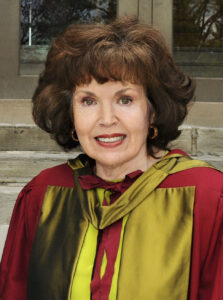
Mary Elizabeth King, PhD, has always been a staunch proponent of civil and voters’ rights, working directly with the Civil Rights Movement in the United States during the 1960s. With a steadfast determination to make a positive difference in the world, she possesses more than six decades of expertise in political science, academia, and authorship, and served as prior director of the James Lawson Institute for a decade. In addition, she serves as a professor of peace and conflict studies at the University for Peace, an institution of higher education and treaty organization of the United Nations with a campus in Costa Rica. Alongside these prominent positions, Dr. King is recognized as a Distinguished Rothermere American Institute Fellow and a member of the Senior Common Room of Mansfield College at the University of Oxford in the United Kingdom. Previously, she was a senior fellow in residence at the Rothermere American Institute.
Over the course of her career, Dr. King has exemplified preeminent knowledge on the subject of nonviolent transformation of conflict, particularly as it relates to the work of Mahatma Gandhi and the Rev. Dr. Martin Luther King Jr. She authored the 1987 book “Freedom Song: A Personal Story of the 1960s Civil Rights Movement,” which garnered a Robert F. Kennedy Memorial Book Award in 1988. With respect and acclaim, writer and human rights activist Leslie Kelen, the executive director of the Center for Documentary Expression and Art, wrote that he believes “Freedom Song is the most complete depiction of the student-led Southern freedom movement.” Among her other award-winning books on nonviolent struggles in contemporary society, Dr. King penned “A Quiet Revolution: The First Palestinian Intifada and Nonviolent Resistance,” with an introduction written by President Jimmy Carter. Outside of her primary efforts in literature, Dr. King has edited and co-authored several volumes of work published by the Africa Programme of the University for Peace and writes for “Waging Nonviolence,” an online magazine.
To prepare for her career, Dr. King pursued formal education at Ohio Wesleyan University, receiving a Bachelor of Arts in English literature in 1962. During her undergraduate studies, she also served as the president of the English Writers Club and was chairperson of the student committee on race relations. As time progressed, she completed coursework toward a Master of Business Administration at Loyola University Maryland in 1975 and attained a Doctor of Philosophy in international politics from Aberystwyth University in the United Kingdom in 1999. Impressively, her doctoral alma mater recognized her as an honorary fellow.
Adjacent to her foremost appointments, Dr. King has also lent her expertise to numerous political posts, having been a presidential appointee confirmed by the U.S. Senate during the Carter administration. In this capacity, she was responsible for the sub-cabinet federal agency that managed the Peace Corps and Volunteers in Service to America (more commonly known as VISTA). Furthermore, Dr. King was an expert consultant on the Middle East for the ABC London News Bureau under Pierre Salinger during the early 1990s.
As a testament to her success, Dr. King has been honored with a multitude of accolades, such as the Distinguished Achievement Award from Ohio Wesleyan University in 1989, the Distinguished Achievement Award from the Women’s Equity Action League in 1977, and the James M. Lawson Nonviolent Achievement Award in 2011. She also earned the El-Hibri Peace Education Prize in 2009 and the Jamnalal Bajaj International Award in 2003. Other awards to Dr. King’s credit have included an honorary Doctor of Laws from Ohio Wesleyan University in 2011 and induction into the National Women’s Hall of Fame in Seneca Falls, New York, in 1992.
Dr. King is exceptionally proud of her illuminating work with the Civil Rights Movement across the decades, having established herself as a pioneer in race relations and international politics. Advocating for peace and universal justice by nonviolent means, she is well-regarded for her efforts in helping individuals, local and national governments, civil society organizations, political figures, and journalists. In the coming years, Dr. King aims to continue her groundbreaking work and dismantle the oppressive force of racism.
